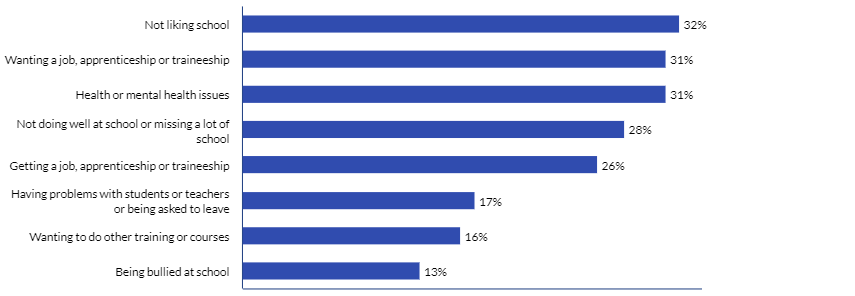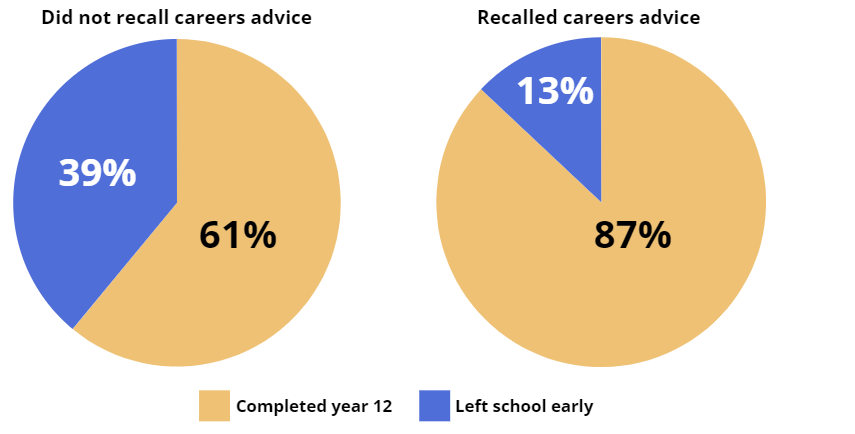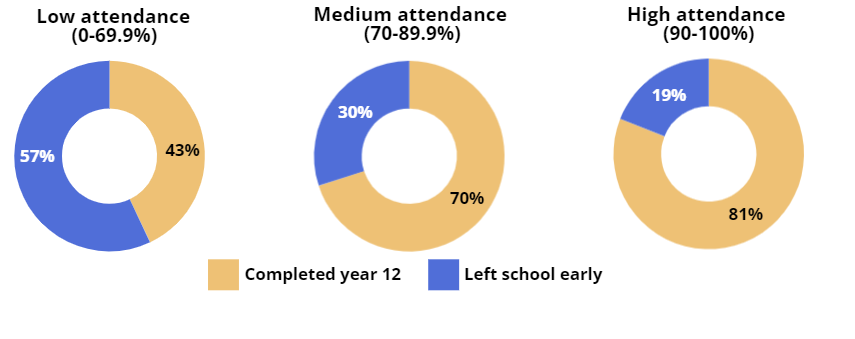If you’re a secondary teacher or leader, what is the average year 12 completion rate for students in your school? Do you know the reasoning behind why some students decide to leave early? How could you best support these students? A new report offers answers to these questions.
The Pathways, Engagement and Transitions (PET) study by The Smith Family examines the post-school pathways of young people experiencing disadvantage. The study’s latest report, Experiences of early school leavers, has just been released and is the third in the PET series. It focuses on year 12 completion of students who were in year 10 in 2020. Overall, there were 2,000 participants involved who completed surveys in 2021, 2022 and 2023. In-depth interviews were conducted with 29 of the participants.
Of these participants, 68% completed year 12, 28% left school early and 4% were still in school when they completed the 2023 survey. A majority of the early school leavers surveyed (65%) had completed year 11 and a smaller number (35%) had completed year 10. The report also shares how things are looking nationally, reporting that year 12 completion rates declined from 79% in 2021 to 76% in 2022.
Crucially, the report found that 92% of students who didn’t complete year 12 said they intended to finish school when they were in year 11. ‘This means there’s a tremendous opportunity to help more young people to realise that goal, through better use of data and more individualised assistance including for literacy and numeracy, better support with mental health and quality careers support,’ Head of Research and Advocacy at The Smith Family, Anne Hampshire, says.
Their research also shows early school leavers were more likely to be male, Aboriginal and/or Torres Strait Islander, from an English-speaking background, to have a health and/or mental health condition and/or be living in a regional area.
Other key findings identify important indicators of year 12 completion, such as attendance, academic achievement and receiving careers advice.
Why young people are leaving school early
The survey findings reveal 8 factors identified by young people as contributing to why they left school early.

[The 8 reasons identified by young people for leaving school early: adapted from The Smith Family, 2024)
Half of all early school leavers identified multiple reasons for leaving school. ‘Those who offered only one reason were most likely to cite having got or wanted to get a job, apprenticeship or traineeship (22% and 17%, respectively) or having health or mental health issues (15%),’ the report reads.
‘Providing students experiencing these challenges with more individualised support while at school [can] strengthen school engagement and completion. The cohort of early school leavers is diverse and leave for a range of reasons, and require tailored approaches to address their needs.’
Careers and pathways education plays a crucial role
International research has shown the positive impacts careers education can have on student engagement and academic motivation. The PET study has found a correlation between a student’s experience of receiving careers advice and whether or not they complete year 12.

[School completion by experience of careers advice at school: adapted from The Smith Family, 2024]
In light of these findings, The Smith Family say increased provision of individualised career advice and support throughout secondary schooling years is needed. ‘Support should be accessible, engaging, and meaningful to young people. Tailored support can both contribute to greater levels of school engagement and completion and stronger post-school pathways for those young people who do leave school early,’ they write.
The report also includes quotes from young people on the topic of careers and pathways education:
We had meetings with the careers counsellor at our school and they would ask us what course we wanted to go into or what job we wanted to do in the future, and advise us on what uni to go to and what ATAR would be required. They also showed me the different pathways in case I didn’t get a high enough ATAR. I could have gotten a Diploma, Advanced Diploma, and so on. At first I had doubts I would get into the course I wanted, but that conversation helped set my mind at ease. It was very helpful so I’m grateful for that. – Ali* (Year 12 completer)
I think it could be more useful to explore different avenues with young people; spend more time talking about the future and what they actually want to do. I think that would definitely help. – Liam* (early school leaver)
*Names have been changed
Early indicators of students who may need extra support
A major finding from the report is the impact poor attendance has on a student’s likelihood to leave school early. Researchers found that over half of students whose attendance was considered low in year 9 left school before finishing year 12, compared to less than 1 in 5 students who had high attendance.

[School completion by year 9 attendance rate: adapted from The Smith Family, 2024]
As well as this, academic achievement appears to play a role in year 12 completion. The data show 45% of participants who received a D or E grade in year 9 English left school early, compared to 21% of students who received an A, B or C grade.
‘These findings reinforce that attendance and achievement can act as an early flag to identify young people needing additional support to complete year 12,’ the report says, adding that continuous monitoring of warning signs throughout school to identify young people at elevated risk of early school leaving is needed.
The PET study has also published reports on the dynamic post-school pathways of young people experiencing disadvantage and the initial post-school transitions of young people experiencing disadvantage.
Teacher has covered the ongoing PET study in a podcast episode featuring Anne Hampshire (Earp, 2022) and an article (Vukovic, 2023) focusing on post-school transitions of students.
References
Earp, J. (2022, November 2). The Research Files Episode 78: Supporting disadvantaged students in post-school pathways and transitions. Teacher magazine. https://www.teachermagazine.com/au_en/articles/the-research-files-episode-78-supporting-disadvantaged-students-in-post-school-pathways-and-transitions
The Smith Family. (2023). Pathways, engagement and transitions: Experiences of early school leavers.
Vukovic, R. (2023, August 11). Research update: Supporting post-school transition for disadvantaged students. Teacher magazine. https://www.teachermagazine.com/au_en/articles/research-update-supporting-post-school-transition-for-disadvantaged-students
The Smith Family says rates of attendance can be an early flag for identifying young people needing additional support to complete year 12. How often do you collect and review attendance data in your own school? How are you using data collected to inform the supports you provide to students?



